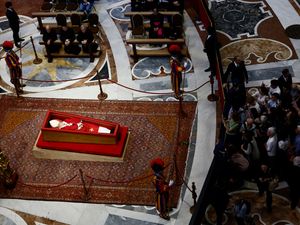Peter Rhodes on Labour, lobbying and a writer with a rare insight into the British Empire
Read the latest column from Peter Rhodes.

After the row over David Cameron allegedly lobbying for Greensill Capital, Lord Pickles suggests there should be a review into lobbying. I can't see it happening. Not if the lobbyists have anything to do with it.
A photo of the Duchess of Cambridge this week showed her holding “her beloved camera,” which looked like a pre-digital film camera. I have a digital camera but I've never fallen out of love with my old Pentax.
Our friends in Germany speak perfect English but occasionally refer to “making a photograph.” That's how it used to be. With film you make photographs, with digital you just take them.
My recent item on Porridge (BBC) reminds a reader that the grim gates of HM Prison Slade have outlived the TV series. Today they are the main entrance to the register office in St Albans, Hertfordshire. The old term “wedlock” suddenly seems relevant.
I'm not sure why I put Hertfordshire in the above item. Does anyone actually know where it is?
When the Guardian produces a headline like this week's: “What is the point of Keir Starmer?” then Labour should be deeply worried. Starmer seems a decent bloke and has put in some fine performances against Boris Johnson in the Commons.
Yet what is the Opposition supposed to do during a pandemic when there are so few options and the public are not impressed by displays of crystal-ball whatiffery?
And before anyone proposes a lurch to the Left for Labour how would that play at a time when a Conservative government is considering pumping public money into the UK steel industry and pundits are charting “the rise of the Red Tories”?
All is changing. How long before Conservatives from the North of England are hanging up their mufflers in Downing Street and their whippets are scrapping in t' yard?
With so much talk about colonialism and imperialism in the Harry and Meghan furore, I dug out an old copy of James Morris's masterful study of the British Empire, entitled Farewell The Trumpets.
In the first few pages you are made aware it was an empire unlike any other, “a gigantic jumble of origins, influences, attitudes and intentions,” that was capable of great goodness but also terrible violence.
There are few golden rules about the Empire as Morris sees it, “so enormous was the span of that association, and so unimaginable its contrasts and contradictions.”
Morris's style is sensitive and so strikingly original that I Googled the author to find out more about him. Or rather, her.
If you haven't already recognised the name, the acclaimed writer, journalist and father of five, who died last year, was James Morris only until 1972.
Then, after surgery, he became Jan Morris and a beacon for transgender rights.
In both literature and personal life, Jan Morris made the point that things are not always as they seem at first sight and if you think you know something as an absolute fact, then you're probably wrong.





